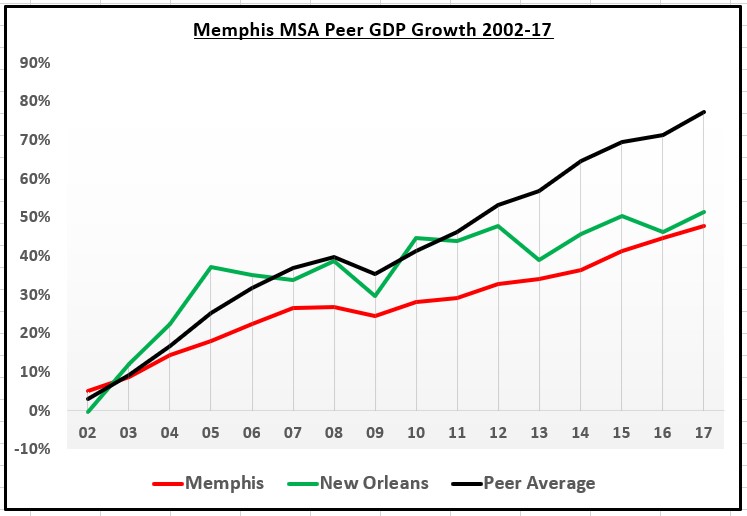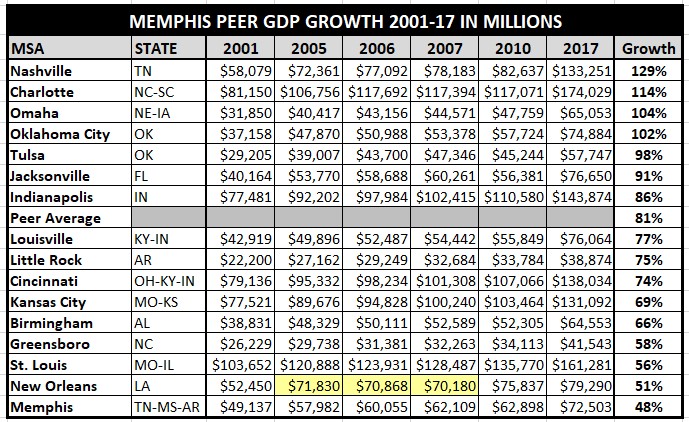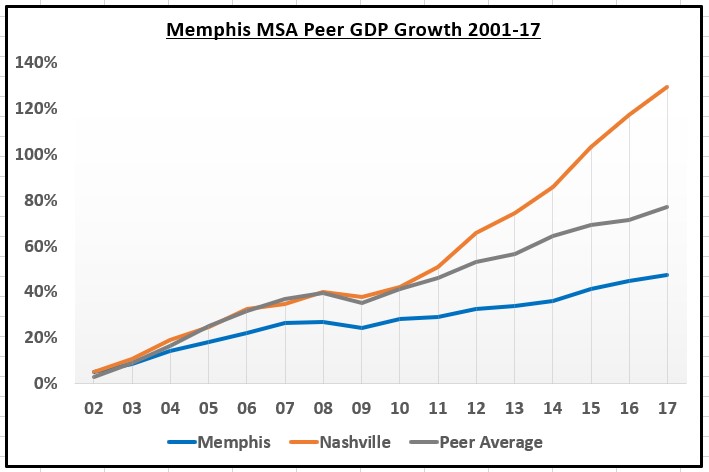Memphis Tomorrow is a national embarrassment while proliferating deficient leadership practices throughout the Memphis community. In fact, using percentage analysis, the internal disaster of Hurricane Hack of Memphis Tomorrow can be shown to be more catastrophic than the $161B external natural disaster of Hurricane Katrina costing Memphis an estimated $13.5B in gross domestic product (GDP) since 2001 when compared to New Orleans.
Content with decline for almost 20 years, the Memphis Tomorrow CEO organization sets the standard and is down in all of their community development categories, while their initiatives feast upon your federal, state and local tax dollars. Since the founding of Memphis Tomorrow in 2001, Memphis has declined without an external event while not being good for anyone to include the overall business community. Memphis is last in peer GDP growth, behind New Orleans since 2001, as the heavily taxpayer funded economic development complex goes institutionally unmeasured in Memphis. See GDP analysis section.
While the skills gap gets most of the attention, the leadership gap in Memphis is paramount. New generation leaders don’t practice legislative or press oversight of the Memphis Tomorrow complex. Social justice and economic development organizations don’t independently author and advocate policy solutions to confront community imbalances. And the university complex is impotent on matters of research based measurement to inform course correction.
The leadership gap is paramount where, because decline is all they know after almost 20 years of Memphis Tomorrow, local Memphis leaders only know systems of decline and don’t seem to know how to course correct to evolve the Memphis ecosystem. And there is no sense of urgency, in no economic development plan after some 8 years or a transit funding solution after 3 years.
Deficient Silver Spooner Leadership Modeled
Meanwhile, just as one feels entitled to draw their next breath, silver spooner elitist hack brats in Fred Smith and Pitt Hyde (Hurricane Hack) have felt entitled to botch the workforce development system over five years, rip off local small business solutions to address community problems while allowing local solution export to foreign or out of town entities, as the economic development complex feeds on a community in need with excessive corporate/real estate incentives in an already low business cost environment. The excessive incentives occur while justifying them with bogus projection accounting. So as designed, the ecosystem declines while wrecking economic growth as new leadership sadly views the hacks as community visionaries.
That is why the question is posed, “With an eye on GDP, as an economic developer, which would you prefer – A. Hurricane Katrina or B. Hurricane Hack?”. If you guessed, A. Hurricane Katrina, you are right. The external event of Katrina is less costly than Hurricane Hack of Memphis Tomorrow that has comparably stagnated Memphis economic growth over almost 20 years while instituting systems of decline.
One would think that Smith, a history fan, might know that rigged systems don’t work in a free enterprise system and would appreciate some level of needed dissent in the system. But Smith might not know his history or if he does, he certainly does not appreciate the application of history. The fact is that the leadership gap, as modeled by the Memphis Tomorrow complex, is the most costly gap.
Its a costly gap, that as a matter of closed system process, the complex feeds on and dismisses their own people, thinking they can evolve the ecosystem without them. They shut out their own people as they launch one new initiative after another within a sea of event pageantry. The leadership gap leaves Memphis without the vital footing to compete in the global economy.
Lacking press and legislative oversight and university complex thought leadership won’t work in any community while the leadership gap explodes in Memphis resulting in a design for eosystem decline.
Gross Domestics Product (GDP) Data
So why would an economic developer prefer Hurricane Katrina over Hurricane Hack? Well, its in the Bureau of Economic Analysis data. Since 2001, when Memphis Tomorrow was founded, Memphis is last among 16 peers in GDP growth and trails New Orleans who suffered a catastrophic external event. Katrina hit New Orleans in 2005. Prior to Katrina, New Orleans was exceeding the peer average in GDP growth and as shown in the chart below, GDP dipped significantly following Katrina.
At the same time, after almost 20 years, New Orleans GDP growth still exceeds Memphis. So, in this analysis, a catastrophic Katrina would be preferable to Hurricane Hack of Memphis Tomorrow that never leaves and has institutionalized rigged system decline resulting in the leadership gap.
Based on a percentage analysis, Hurricane Hack is $13.5B more costly than Hurricane Katrina in impacting GDP resulting in an estimated $5B in total wage loss and $150M in deficient tax revenues since 2001. The problem is this type of analysis is unknown in the disconnected from reality bubble of Memphis where fantasy $19B capital investment promises take center stage while distracting from reality and the work of economic growth.
See spreadsheet analysis and see below charts/tables where arguably a Memphis trendline of stagnating corporate socialism is revealed.
The below chart shows the relationship between Memphis GDP growth and that of the peer average and Nashville. Nashville soared upwards from 2011 at the same time EDGE was created. EDGE is a Memphis Tomorrow Fast Forward initiative that has authored bogus projection accounting and excessive corporate/real estate PILOTs for the benefit of the small few while feeding on a Memphis community in need.
Further, while Memphis formerly competed against Dallas and Atlanta, even new peer cities that once trailed Memphis in total GDP in Oklahoma City, Jacksonville and Louisville have surpassed Memphis in total GDP. Of course, no one in Memphis is going to know this, as the Memphis economic development complex is unmeasured and unchecked, leaving Memphians ignorant while sheltered in a bubble.
Based on a percentage analysis, when compared to the peer average, Hurricane Hack has resulted in $131B in lost GDP, $49B in lost wages and $1.5B in lost tax revenue since 2001. Further, annually recurring total wage deficiencies have accumulated to an estimated $6B, resulting in $180M in recurring annual tax revenue shortfalls from deficient below average GDP growth since 2001.
See below chart and see here to access excessive tax incentive data which are justified with EDGE bogus accounting.
Conclusion
Hack spooner elitism is the root cause of community decline where Memphis has declined without an external event, while Memphis Tomorrow sets the standard resulting in the leadership gap. The solution is community education. But with the university and investigative press out to lunch in Memphis, that is likely not going to be facilitated from these more traditional sources that actually serve other communities.
While other communities have been doing the data driven work of true economic development, the Memphis Tomorrow complex has been feeding on its own people within a closed disconnected from reality social construct that has nothing to do with data driven economic development. All the while, they market their efforts as economic development within a design for decline framework where the greatest casualty is leadership leaving a leadership gap and a community without the footing to compete in a global economy.
Other solutions include incentive reform, transit funding, a connected workforce development system and increased legislative and press oversight. This blog is on published and legislative record with specific solutions of the former. If you have questions regarding specific solutions, please email me at jkent@pathtrek.net
I wonder if Paragon Bank addresses the leadership gap in their economic talk on Tuesday 9/17/19 ? We will see…..




